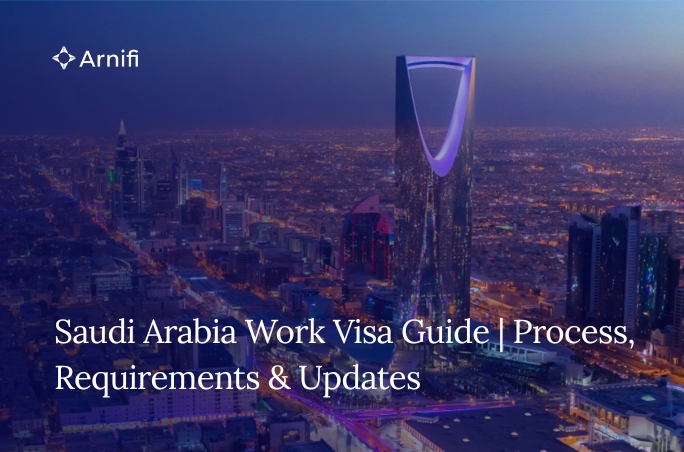Saudi Arabia Work Visa | Requirements, Process & Key Updates
by Ishika Bhandari Sep 24, 2025  7 MIN READ
7 MIN READ

Are you thinking about starting a work career in Saudi Arabia? This guide contains everything to do with the workings of work visas, eligibility, application, and changes that are projected for the year 2026. Know how Arnifi could assist you in making your journey easier and ensuring a smoother process.
Table of contents
1. Introduction
Given these significant Vision 2030 reforms, Saudi Arabia has emerged as a territory attractive to qualified professionals: less dependent on oil and turned more of its private sector into the engine of the economy, thereby boosting demand for international talent. The income is tax-free, salaries are competitive, and there is scope for career development for professionals in Saudi Arabia, drawing talent from all directions.
Foreigners wishing to work in the Kingdom must have a work visa and have an Iqama issued upon approval. This is the law within the Saudi labour framework for all workers who are non-Saudi, irrespective of whether them being on a short-term, long-term, or specialized work visa.
2. Overview of Visa Types and Classifications
There are different kinds of work visas offered in Saudi Arabia based on their purpose and length of employment:
- Temporary Work Visa – For short-term assignments or consultancy in Saudi Arabia
- Employment Visa – For long-term contracts and residency
Another substantial development is the skill-based classification system coming in mid-2026 from the HR Ministry of Human Resources and Social Development. The plan classifies jobs by capabilities and background, creating an influence on the regions of visa approval, salary brackets, and career pathways.
The new classification is being established so that jobs can be more aligned to the skill level of applicants, thus creating greater clarity and fluidity in the application process. Yet, the employer must still sponsor the applicant in Saudi Arabia.
However, it is important to know that after arrival, the Iqama will be needed. Work visas are only an entry permit for the purposes of employment, while the Iqama is to regulate residency and working rights inside Saudi Arabia.
3. Eligibility / Requirements
Important eligibility requirements would be:
1. Educational Qualifications & Experience
The job categories will require minimum qualifications and relevant experience. Documents such as degrees or experience letters must be attested.
2. Salary Thresholds
With the new classification scheme, salary threshold, etc, will be determined on the basis of skill levels required for the job.
3. Medical Examination
All applicants must undergo medical tests at an accredited centre in their home country for screening for communicable diseases.
4. Document Attestation
All educational or professional documents must be attested as follows:
- By the Ministry of Foreign Affairs in your home country
- The Saudi Embassy or Consulate in your home country
5. Sponsorship
A valid job offer from a Saudi employer (sponsor) is compulsory. The employer will run the application from the beginning through HRSD (Human Resource Service Delivery), MOFA, and increasingly Qiwa.
6. Valid Passport
Your passport must be valid for at least six months beyond the intended period of stay.
4. Application Process (Step by Step)
1. Job Offer and Sponsorship
This begins with securing a job offer from Saudi employers.
2. Document Collection and Attestation
Prepare:
- Passport
- Degree/educational certificates
- Experience letters
- Medical report
- Passport-sized photos
Ensure the attestation of all documents.
3. Employer Submits Visa Request
The employer requests a Block Visa or work visa invitation from HRSD and MOFA, usually done through Qiwa.
4. Visa Stamping
After the invitation letter is approved, you’re to submit your passport along with attested documents and a medical report to the Saudi embassy/consulate for visa stamping.
5. Arrival and Iqama Process
After arrival in Saudi Arabia:
- Biometrics: Fingerprint registration at Jawazat (Passport office).
- Medical Check-up: May require again locally.
- Iqama Issuance: Your employer applies for your residency permit (Iqama).
5. Costs and Financial Aspects
1. Visa and Processing Fees
The standard government fee would apply to visa applications and document processing. Some may be paid by the employee, and others by the employer..
2. Sponsor Fees
In most cases, the employer bears the costs for:
- Visa issuance
- Work permit fees
- Iqama fees
3. Levies and Insurance
Employers in Saudi Arabia pay levies for hiring foreign workers and provide mandatory health insurance.
4. Family Sponsorship Costs
If you’re bringing some dependents, expect to pay:
- Visa fees for each dependent
- Monthly levies (varies by employer policy)
6. Rights and Legal Obligations
Your Rights
Holders of work visas are entitled to:
- Protection through the Saudi labour law
- Health insurance
- Paid time off periods and regulated working hours
- Termination benefits
Your Obligations
- Work only for your sponsoring employer
- Maintain a valid Iqama and visa
- Obey Saudi laws
Consequences of Violations
Violations like working with another employer, overstaying, or falsifying documents could result in:
- Fines
- Deportation
- Entry bans
7. Common Challenges
1. Attestation Issues
Documents that are improperly attested can cause long delays or failure of the visa application.
2. Skill Classification Errors
Misclassification of skill levels between your credentials and the new HRSD skill tiers could affect your approval or salary offers.
3. Processing Delays
These arise as a result of:
- Documentation mishaps
- Embassy backlog
- Employer window
4. Cultural and Legal Differences
Get familiar with labour regulations in Saudi Arabia regarding holidays, etc., as they are quite different from Western conventions.
8. Recent Changes and Events
1. Skill-Based Visa Classification (HRSD)
Expected to begin in mid-2026, it will classify expat workers based on their:
- Education
- Experience
- Salary levels
This will, in turn, affect visa processing as well as job eligibility.
2. Digitalization
Technologies such as Qiwa, MOFA, and Absher are unifying and simplifying application procedures for transparency and speed.
3. Policy Changes
Keep up to date with changes in:
- Salary thresholds
- Dependent visa rules
- Sponsorship policies
9. Tips for Expats
- Be Meticulous: Check that those documents are accurate and properly attested
- Choose Employers Wisely: The best employers are those who are quite knowledgeable in sponsoring expatriates and also make the entire process simple
- Keep Everything Updated: Keep your passport current and have both digital and physical copies of all documents
- Use Professional Help: It may be an idea to seek legal or agency assistance if this is your first time applying or in a complex case
- Connect with Other Expats: Forums of expatriates, or online/share communities within the expatriate community, for practical information
10. FAQs
Can I bring my family with me?
Yes, you can sponsor your wife and children (salary thresholds apply) once your Iqama is issued. Separate applications and fees apply.
How long does the process take?
Typically, 4 to 12 weeks, depending on embassy workload, employer readiness, and document accuracy.
Can I switch jobs in Saudi Arabia?
Yes, but only through a formal sponsorship transfer approved by your current and new employers, under HRSD guidelines.
What if my degree doesn’t match job requirements exactly?
Flexibility may exist if you have substantial related experience, but with the new classification system, that may be reduced. It would be best to ask your employer or a visa expert.
11. Conclusion
Saudi Arabia promises a thrilling career in a rapidly changing economy. Planning requirements and reliable documentation are vital, as well as keeping abreast with evolving regulations, when it comes to navigating the work visa and Iqama processes.
Start looking into getting a reputable job offer, have all qualifications and documents attested, and continue checking on the official channels, like MOFA, HRSD, and Qiwa, where policies are under constant upgrading. Start your Saudi journey in career confidence with Arnifi, which makes the entire process, from job offer to visa application, document attestation, and Iqama support, easy to handle. Trust our experts to walk with you every step of the way. Sign up with Arnifi today.
Top Saudi Arab Packages

Related Articles
Top Saudi Arab Packages



